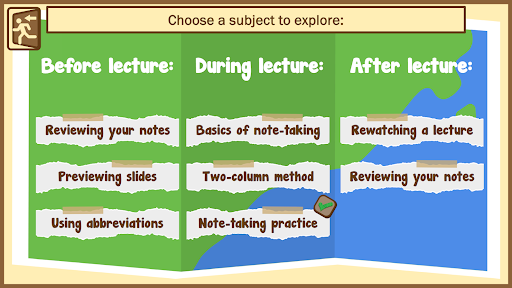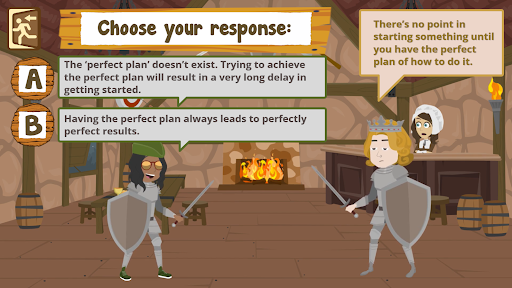By Geraint Edwards
Introduction
SpLD Study Quest is an online interactive resource created by the SpLD (Specific Learning Differences) and TEL (Technology Enhanced Learning) teams at the English Language Teaching Centre. It’s a point-and-click adventure designed to help students with SpLDs tackle some of the things that they commonly have difficulty with.
Scenario
The setting is an island which students explore to complete a series of tasks in the following three areas: Note-taking for lectures, Essay titles and structures, and Procrastination and time-keeping. Students can complete the areas in any order they like across the three locations: Forest, Mountain and Castle, and within those areas there is a mix of linear and modular tasks. We were aware that some students would not want to do the full-blown animated adventure version but would still appreciate the input and the practice tasks, so a full “Basic” version can be accessed from the starting page.
Visual style
In the full version, navigation is integrated into a series of interactions with animated backdrops. These animations are created in Vyond (animated video creation tool), and then imported into Storyline (interactive materials software). In Storyline, these snippets of video are stitched together into a series of branching paths, giving the impression of walking around a scene and interacting with objects.
Structure
Each area presents a smaller area to explore, and then areas within those, so there is plenty to investigate. For example, the Mountain area (Essay titles and structures) is split into Understanding essay titles, Structuring an essay text, and Introductions & conclusions. Within the Understanding essay titles section, for example, there are areas on Question components, Identifying instructions and Analysing titles. Each section contains a variety of task and question types such as Matching, Drag and Drop, Hotspot, True/False and Multiple Choice. There is no scoring, only feedback, with opportunities to try again before being told the answer. Players can always leave to another section or choose to see answers - they can’t get trapped or stuck - so the experience is low-stress.
Narrative
A challenge with this project was to place the tasks within an engaging visual and interactive context that complemented the activities conceptually and didn’t distract from the learning objectives. The only area which is inaccessible to begin with is the final castle area, which is cut off until you complete 3 other areas. This is because this section is structured around a story where the player must help villagers through teaching them techniques, arrived at through some guided reflection. The visual metaphors used in these sequences are designed to aid retention of the techniques.
For example, the player must fence with Prince Perfect by providing counterarguments to his unhelpful but commonly held beliefs which lead to procrastination. The player is awarded prizes for these interactions such as the Sword of Imperfection, the Hammer of Chunking and the Bow of Focus. These can then be used in the final battle against the Procrastination Dragon, reinforcing the techniques so that they’re recalled when needed.
Process & Team
My role as part of the ELTC’s TEL team was to design and build the experience in the software, working closely with Paul Barnes and Victoria E Cartledge-Mann from the SpLD team. I have no SpLD qualifications, so the focus of the content was handled by them and their expertise. I designed the structure around the topics they thought were most relevant, with them providing most of the content and me building the environments and tasks. ELTC TEL Director David Read was key in making excellent recommendations, finding bugs and suggesting how tasks and navigation could be improved from an instructional design point of view. Some of the language and academic skills-focused tasks were provided by the ELTC. It was a great team effort, and a really satisfying project to be a part of.
Feedback and next steps
The project has received positive feedback from students, who reported finding it engaging, clear and fun. This year the SpLD and ELTC TEL teams were awarded the Community Award by the National Dyslexia Association, citing Study Quest. A couple of journal articles are in progress. Here’s the 10-second showreel that appeared around campus to promote it:
- Geraint Edwards is a Learning Technologist and English Teacher at the English Language Teaching Centre. He’s interested in using games and storytelling for learning.
- Paul Barnes is an Assistant Director of the SpLD Service. He's interested in discovering innovative ways to break down barriers to learning.
- Victoria E Cartledge-Mann is the Academic Director of the SpLD Service. She is interested in using technology to break down barriers and create inclusive learning environments.
- David Read is Director for Technology Enhanced Learning at the English Language Teaching Centre and has years of experience running online and blended teaching and training programme







